If you’re new to online selling, your first consideration should be deciding which eCommerce platform you’ll use to build your store. In this industry, there are some top leading companies in the field, and Shopify is a giant of online eCommerce which is now allowing millions of businesses to sell products online. On the other side, Neto claims themselves as the number 1 eCommerce platform in Australia, the best all-in-one software for running a growing retail or wholesale business from small to enterprise.
To help you decide which one is more preferable, we are going to present to you:
- An overview of Shopify vs Neto
- A detailed comparison between Shopify and Neto
- Wise advice on how to choose the best eCommerce platform for your store
Need Help To Migrate Your Store?
LitExtension provides a well-optimized Cart to Cart migration service that will help you transfer all your data accurately, painlessly with utmost security.
Overview
Shopify

Shopify is considered one of the most popular eCommerce platforms in the world. It is a hosted eCommerce platform in Canada founded in 2004. This platform is an excellent choice for beginners, as you don’t need any experience in coding or website design. As such, you can get started quickly, forget about the tricky development process and simply focus on building your eCommerce business.
Since 2023, Shopify has been used by 4+ million live websites in the world and takes over 20% eCommerce usage distribution in the Top 1 million sites, enough to show that the company is a top player in this industry.
Discover more about Shopify:
Neto
Neto was founded in Australia with the main purpose of providing services for Australian retailers. It is a cloud-based platform and a complete multi-channel eCommerce solution. Neto is a B2B and multi-channel eCommerce platform that offers users an all-in-one solution for eCommerce, POS (point-of-sale), order management, inventory management, and shipping labeling. This platform is a very unique kind in Australia with 2,409 live websites, which accounts for 90% of the total usage of Neto.
-
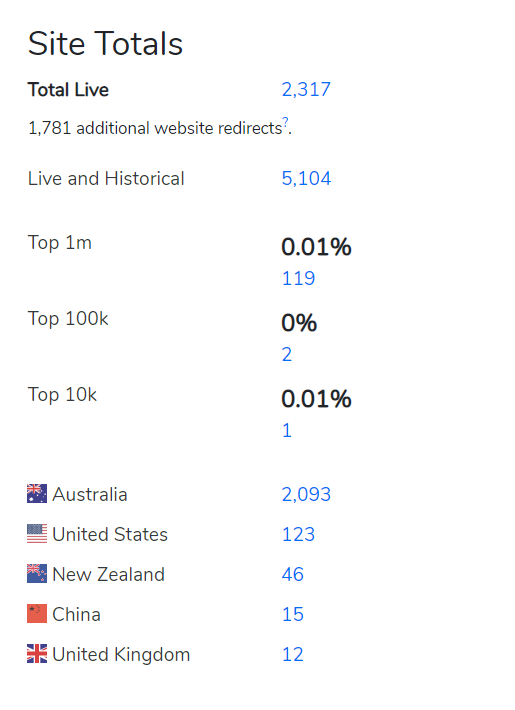
Neto usage distribution
Shopify vs Neto: Which One Should You Go For?
Pricing
Neto
Neto does not have a free version but it does offer a 14-day free trial without requiring any contract or credit card. You can choose from 3 individual plans which can be billed monthly or annually, depending on your preference.
-
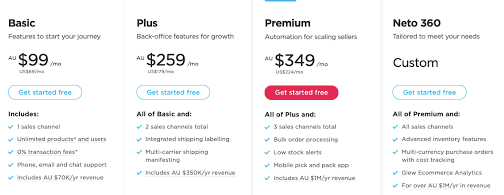
Neto Pricing
Basic Plan (109 AUD ~ 79 USD) – This plan will help you set the first foundation for your online store, with an unlimited number of products and a 0% transaction fee.
Plus Plan (289 AUD ~ 199 USD) – This plan will be a stepping stone for your store’s development in the future. You can freely select the features that this plan supports and also smooth delivery.
Premium Plan (389 AUD ~ 249 USD) – This is the most appropriate plan for you if you have been in the retail market for a long time. With a total of 3 sales channels and the low stock alerts and bulk order process features, all activities in your store will work professionally more than ever.
If you wish to have more advanced features that ultimately support your website, you can choose the Neto 360 Plan – a custom plan to facilitate growth and provide endless flexibility.
Shopify
On the other hand, Shopify has 3 pricing plans: Basic Shopify, Shopify, and Advanced Shopify, with a monthly fee as shown below.
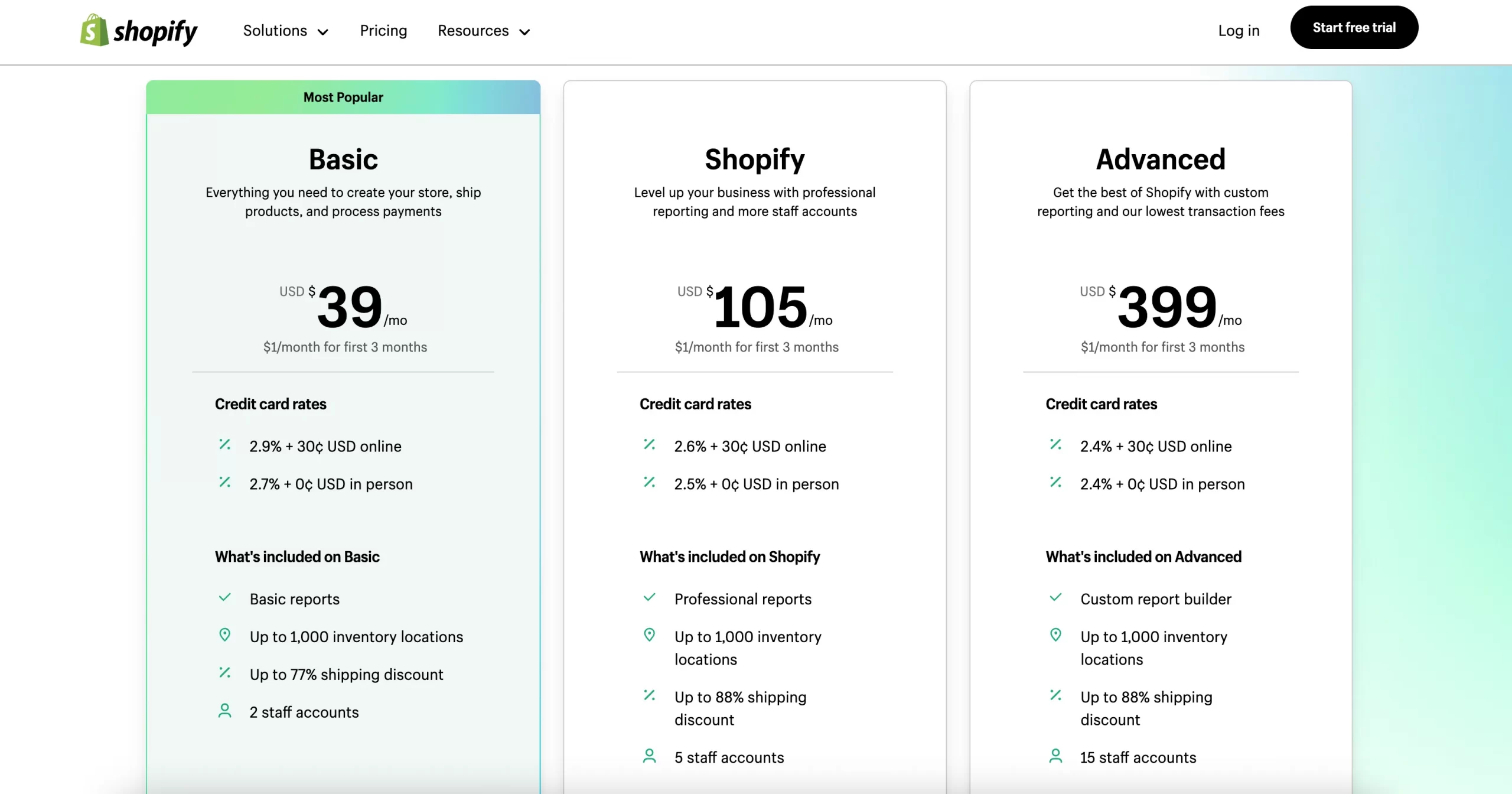
You can also try using Shopify for 3 days for free just by registering with your email address. And just like Neto, Shopify has Shopify Plus – a plan to serve large enterprises with many advanced features and complete privileges that comes with a 2000$ starting price.
While the Basic Plan is suitable for small businesses, the Shopify and Advanced Plan will be the solutions for medium businesses and large enterprises. Shopify Plus is the solution for large businesses with more advanced demand.
Want to migrate to Shopify?
If you are intending to migrate from Neto to Shopify, LitExtension offers a great migration service that helps you transfer your data from the current eCommerce platform to a new one accurately, painlessly with utmost security.
Ease of use
For most eCommerce beginners, choosing an easy-to-use platform to start with is very important. A platform with a user-friendly interface can be the key player that can save your time and effort.
Shopify is one of the most simple platforms in the eCommerce industry. It is praised by most users for its easy starting process and user-friendly editor. You can create your free 3-day trial account with your email after answering a few questions about your business. Once you finish, you’ll be able to access your Shopify dashboard.
-
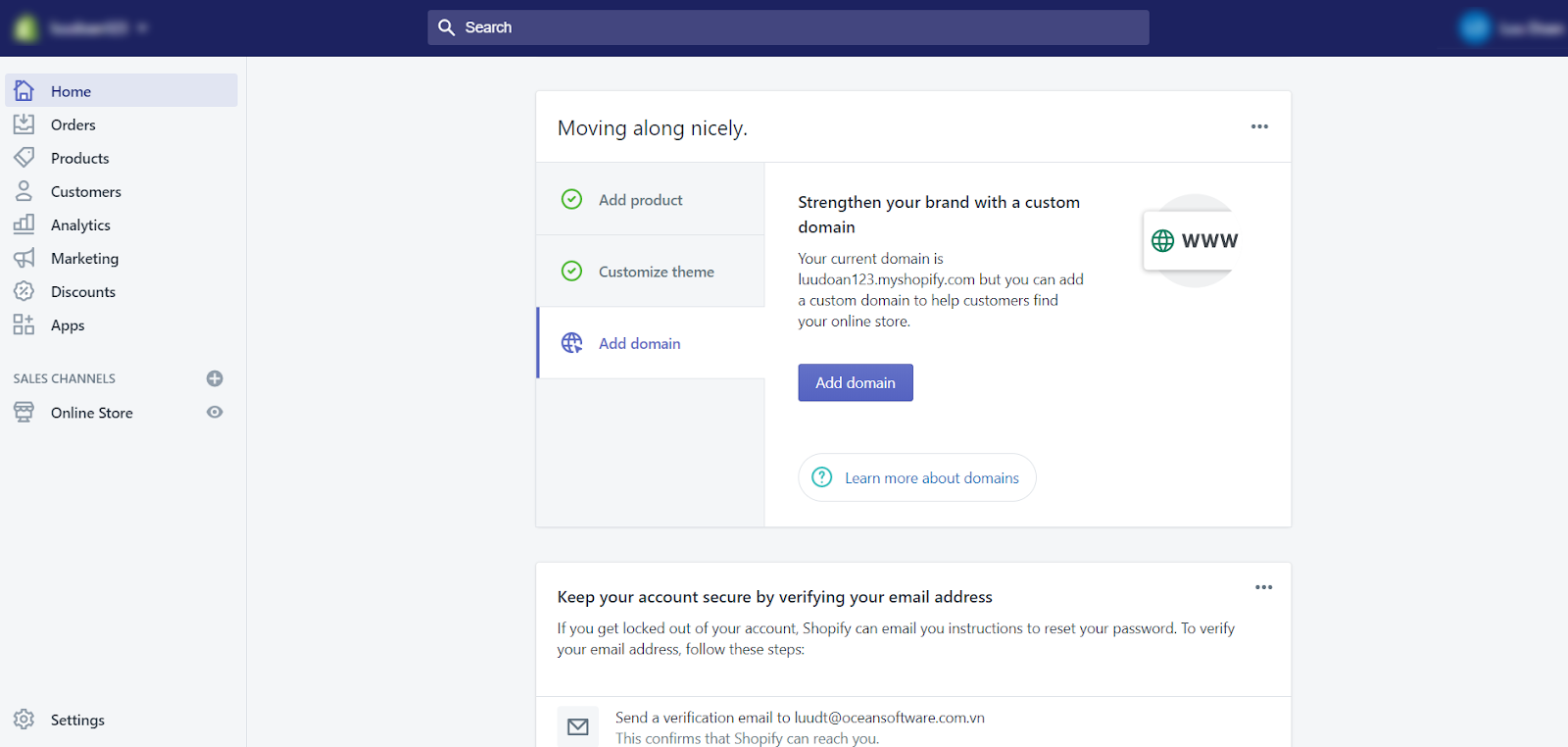
Shopify dashboard
With just a few clicks, you can create products, manage your inventory, add apps and plugins from the left function column.
If you are looking for a detailed guide on how to manage your Shopify store. Check out this video!
Shopify has its own official theme store. These themes are all guaranteed to have full support from the designers so you know that your store is in good hands. In addition, you can preview your themes if it’s in good design, or suitable for your site. Using Shopify, a decent website can be created without any coding or technical knowledge.
Neto on the other hand is quite more inferior than Shopify. However, its interface is designed to be suitable for their loyal customers and Neto. Especially, Neto had features that most of the others simply didn’t like “Automation and time-saving features” or “Invoice and email notifications”. Login is also easy with Neto with just an email and password, comes along with a very eye-catching dashboard interface:
-
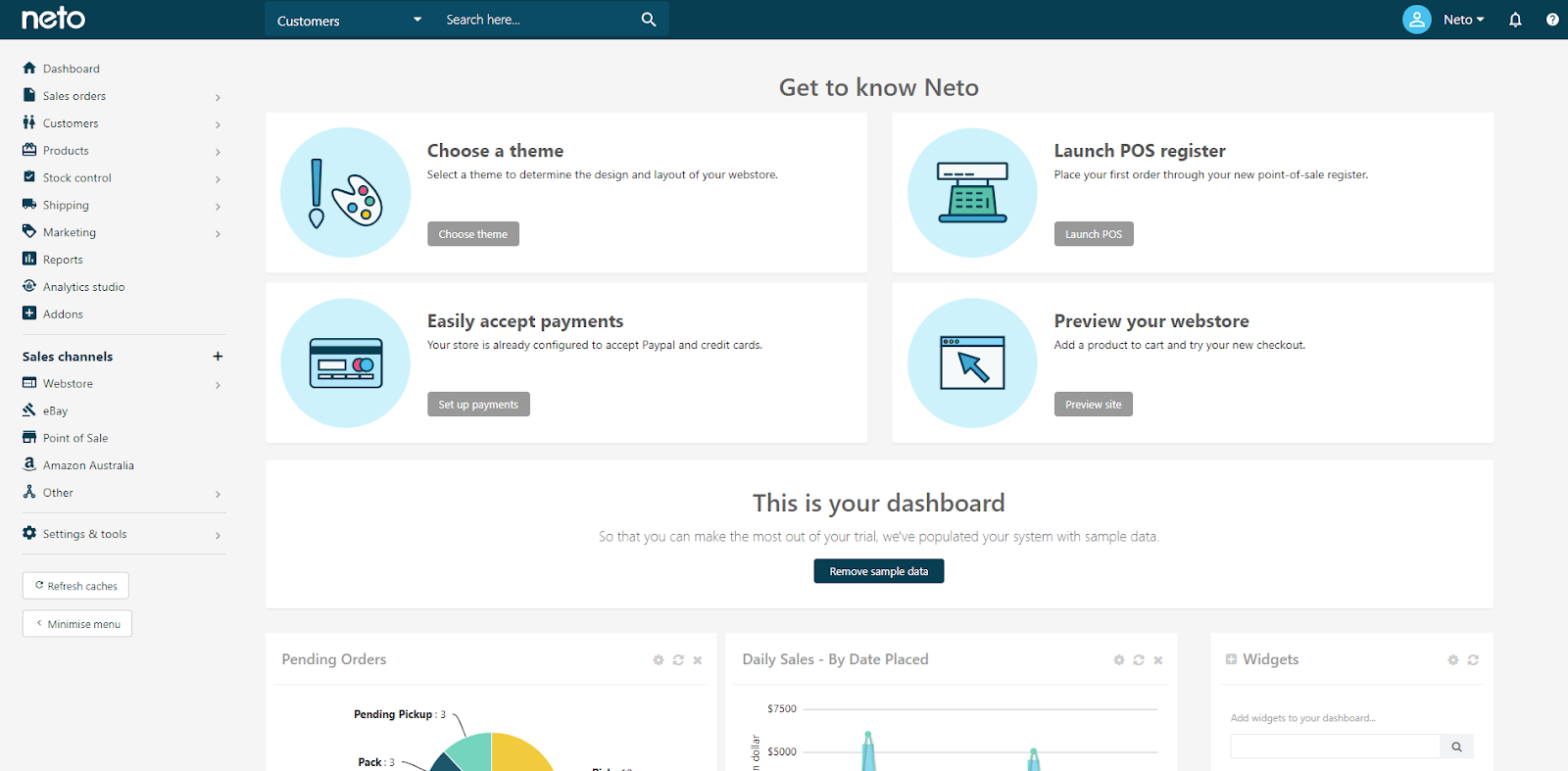
Neto dashboard
Although they do have some impressive features, still, Neto ease of use is nowhere near to Shopify’s – a platform is much easier to use with simple editing tools, a visible ‘undo’ button, a clear and simple interface.
Themes and Customizability
Shopify is well-known for its amazing themes and design – which are specially created by professional designers, not just some coding developers. Shopify offers 120+ contemporary and sophisticated themes, so you are sure to find something that suits your style and the personality of your eCommerce store. The hosted eCommerce platform provides you with both paid and free themes. So you can have a design in your budget or a free one then you can upgrade your store to make it a better look. There are 11 free themes and the remaining 90+ themes range from $0-350. Besides, each theme has specific variations.
Neto’s prices are various, but on average, they are a little more costly than Shopify’s, with fewer options available. There are about 40 Neto themes created for specific categories such as Fashion, Health & Beauty, Food, etc. Start-up stores can easily start selling on this platform.
-
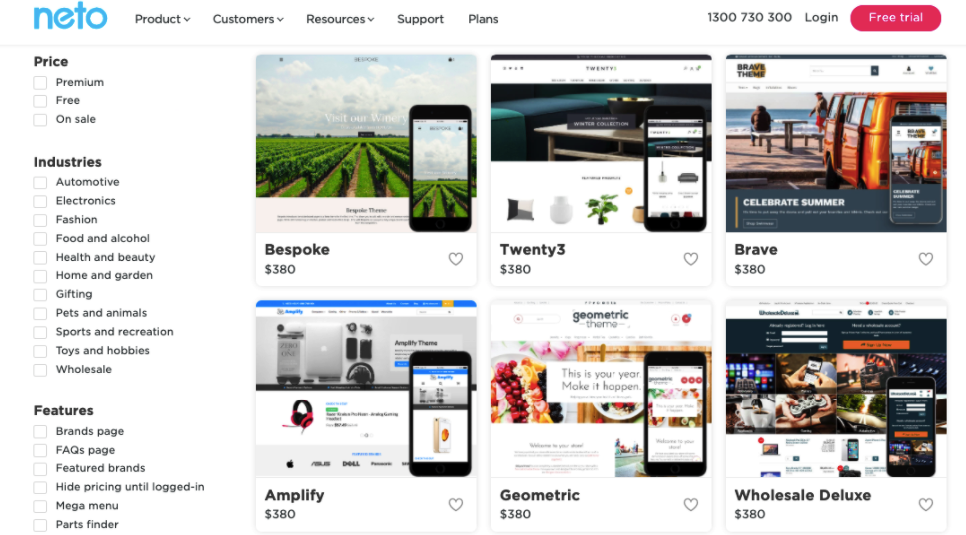
Neto themes
The paying rates of Neto and Shopify themes are similar and the minimum one-off payment cost is $299 AUD when buying the theme from Neto, whereas Shopify themes are up to $255 AUD.
The Verdict
In this comparison, Shopify is absolutely a winner with lower-cost themes and design, more flexible customizations and an attractive interface.
Apps and Add-ons
If themes and customizations are the visual of a website, then apps and add-ons are the functions of a website, which decide the functional power of a platform.
Shopify has one of the best eCommerce app stores around, with more than 2400 apps available, including 3 types: Private apps, Public apps and Unlisted apps. Apps are created variously so you can have more specific functions that match your store exactly. You can add a wishlist, make a dropshipping, send customers notifications or convert currency. You can choose anything that is helpful for your store.
Apart from the free themes, premium ones are about 15$ to 50$. With Shopify’s massive apps store, you can literally pick as many as you like and there are still thousands of options available.
You might be also interested in reading:
Neto seems to fall short when it comes to this particular section… Some of Neto’s apps and add-ons are very impressive and appealing. However, the choices are limited with 90 available apps and add-ons. Below are the best apps available to integrate for different purposes and functions:
- Accounting: Xero and MYOB are two of the most popular Australian accounting software where you can share and sync orders, inventory, customer, invoices, and sales data to automate your accounting.
- Analytics and optimization: Neto has some great plugins such as which help you manage your sales index or financial stats such as Google Analytics, Findify.
- Marketing: You can integrate into MailChimp, Facebook, Instagram, etc and reach more customers.
- Customer Management: Salesforce, Microsoft Dynamics CRM and Zoho CRM are integrated with Neto to help store owners keep more control over customers and tracking their customer behavior across all sales channels in a centralized database. These tools also help to segment your customer listings or connect to an external CRM.
The verdict
Shopify easily wins the competition with its large eCommerce app store. Shopify app store offers different apps/plugins for various functionalities to build your store. Neto lost the battle despite some good quality apps because of its limitations in apps/add-on.
SEO & Marketing
Marketing
SEO – Search Engine Optimization is the process of improving a website so that it becomes more favored by search engines. . The higher the rank of your eCommerce website, the higher the traffic you’ll get.
Shopify makes many marketing campaigns to boost their brand awareness and product sales mainly from third-party integration. Recently, Shopify has introduced an email marketing tool called Shopify Email which comes along with other marketing plans. Shopify does well with social media when they have a multi-channel integration, you can connect your store to Twitter, Instagram, Amazon,..The content marketing team are the ones who create blogs, feature user-generated, feature customer testimonials,…
Neto also has marketing and promotion strategies to create a promising trademark for its brand. Like Shopify, Neto builds social media and email marketing as well. Mailchimp, Instagram Gallery, Review.io are Neto’s integrations third-party. This helps online store owners increase their business visibility, attract customers and improve sales.
SEO
Shopify has quite a strong SEO functionality and a powerful support team. Their SEO main focus is around eCommerce with a simple, effective interface. Tools and methods are used to increase ranking, keywords, images. Furthermore, they cover most essential aspects such as meta title, meta description, custom URLs, headings, image alt text, etc.
Shopify does have free and paid SEO plugins. One of these is the PluginSEO app, which has a great number of users. There are several SEO tools that Shopify is making use of:
- Plugin SEO
- SEO Meta Manager
- Ultra SEO
However, Shopify SEO features still have a minor inconvenience, Certain URLs bear a mandatory string and Robots.txt file and Sitemap isn’t available for modification which isn’t good for SEO. This can bring unpleasant experiences for users.
Neto offers users tips to optimize their sites using sophisticated programming. Global content delivery network, customizable URLs, XML sitemaps are the SEO elements that Neto focuses on. Besides, there are other marketing features of Neto, such as:
- Abandoned cart saver – To install and configure the abandoned cart saver add-on:
- From the Neto dashboard, select Addons.
- Scroll down to Abandoned Cart Saver and click on Install button.
- Select the Send abandoned cart customer email box and click the Save button.
- Click the Close button.
- Integrated email marketing: Automatically email product recommendations, recover abandoned carts and welcome your subscribers.
- Cross-sell and up-sell: this tactic encourages the customer to buy additional items that complement their selection.
The Verdict
Although Shopify’s imperfect marketing plans, it still has a superior win against Neto. Similar to the marketing section, Shopify is just slightly better than Neto in terms of SEO when Shopify itself has robust SEO functionalities and a great supported team.
Security
Both Shopify and Neto stores are certified Level 1 PCI DSS compliant – an information security standard for organizations that handle branded credit cards from the major card schemes. This method will perfectly protect and secure owners’ data, customer information.
They also both provide SSL security that encrypts data transferred between customers and your website. Credit card transactions, system login, webmail are these methods applications. Shopify uses HTTPS instead of HTTP to publish your store’s content securely. Neto security system also meets the standards just like Shopify.
-

PCI DSS Compliant
Help & Support
| Shopify Lite | Basic Shopify | Shopify | Advanced Shopify | |
| Support offered | Email and live chat, Shopify Help Center | Live chat, phone, email, Shopify Help Center | Shopify Help Center, phone, email, and live chat, | Phone, email, and live chat, Shopify Help Center |
At this time, Shopify is supporting through 24/7 email, live chat on all Shopify plans. Except for Shopify Lite users, all merchants using this platform can receive 24/7 phone support. Shopify supports 19 languages for store owners. However, Shopify’s phone and live chat support services are only available in English.
Besides, you can always get guidance and information using Shopify help center – a document collection created for customers to search and read.
Neto’s customer service also assists you via email, phone, or live chat, but it’s a little bit different from other platforms’ since you can book appointments with one of the supporters that you have worked with previously.
-
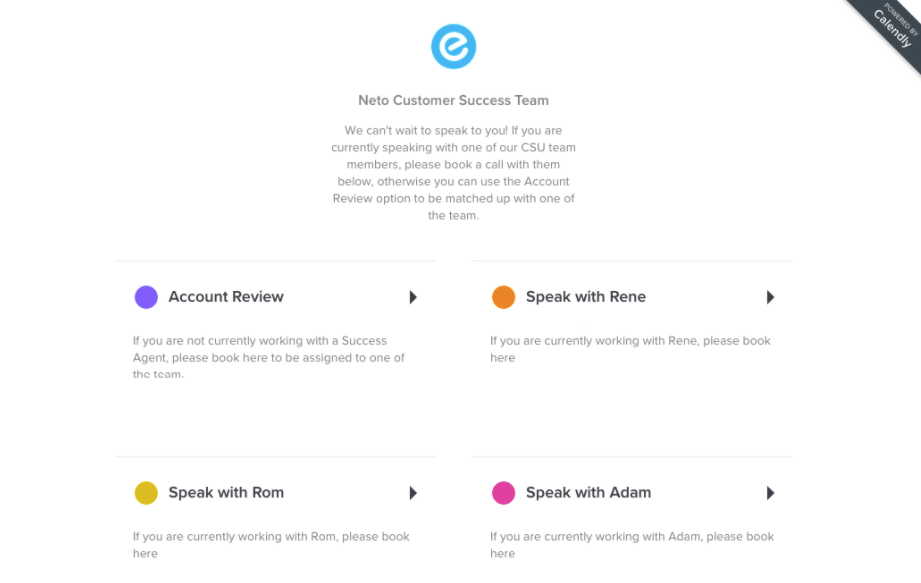
Neto support team
The very problem of both Shopify and Neto support is the response time, which usually entails a 30-minute hold time. However, Shopify provides more comprehensive support services on a 24/7 basis than Neto, along with excellent live chat for customers.
Conclusion
To sum up the comparison, we have summarized the important points in this table. You can see that Shopify is superior to Neto in almost every aspect.
| Function | Winner |
| Pricing | Neto charges extra for Amazon |
| Ease of use | Shopify |
| Themes and Customizability | Shopify |
| Apps and Add-ons | Shopify |
| SEO & Marketing | Shopify |
| Security | Draw |
| Help & Support | Shopify |
We hope this article can help you compare these two platforms. If you find Shopify profitable, don’t hesitate to create a Shopify store, as it takes only a few minutes to complete setting up your store.
In case you want to migrate your Neto site to Shopify, we’d love to help. Currently, LitExtension has been supporting migration from over 200+ shopping carts, including Neto to Shopify migration. If you are not familiar with technical skills and coding knowledge, check out our All-in-One package. This A-to-Z service is a perfect choice for you because we can handle the job accurately, safely and automatically.
We are here to reinforce the best migration experience for you. If you have any questions regarding this article or migration to Neto or Shopify, don’t hesitate to contact us. We’re 24/7 available to help you with our best service.
You can also join our Facebook Community to get more eCommerce tips and news.
